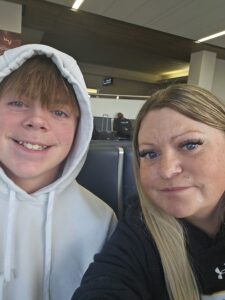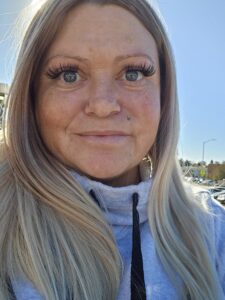Defying the Odds: Tiffany’s Journey
When Tiffany Shank was three years old, her parents noticed that she lacked energy and was constantly lethargic—far from the typical active toddler. Alongside her fatigue, Tiffany developed bruise-like patches on her skin, predominantly on the left side of her body.
Her parents sought answers from multiple doctors, only to face accusations of child abuse due to the mysterious bruising. As hope dwindled, they took her to one last doctor in their small Vermont town—a physician fresh out of medical school. He conducted a thorough head-to-toe examination and, though uncertain, suspected a rare condition. To confirm, he referred Tiffany to the Children’s Floating Hospital in Boston for extensive testing.
There, she endured a muscle biopsy, a barium swallow, numerous blood tests, X-rays, CT scans, MRIs, and more. After weeks of anxious waiting, her parents received a phone call to bring Tiffany back for the results.
The doctor delivered devastating news: Tiffany had scleroderma, an incredibly rare disease, especially in children. He told her parents that there was no cure, only limited treatments, and that she would likely be bedridden by age 10 and not survive past 15. Tiffany, though young, remembers the doctor’s words vividly, as well as the heartbreak on her parents’ faces.
That was the moment that she knew she had to learn to advocate for herself —just as she was finding her voice for the very first time.
A Childhood Marked by Challenges
From that moment, Tiffany’s life revolved around medical appointments. Every two weeks, she traveled from Vermont to Boston for monitoring and treatment. Initially placed on D-penicillamine, she experienced weight gain and continued fatigue. Her school years were far from ordinary. Due to frequent absences, she required additional support, including an Individualized Education Plan (IEP). She missed recess, not because of playtime restrictions, but because she was inside working with a physical therapist. She had no ability to be a “regular” kid.
Despite relentless medical struggles, Tiffany found solace in sports. Field hockey, basketball, and softball kept her body moving, slowing the atrophy beneath her morphea patches and helping her scleroderma from advancing. Being active helped counteract the muscle deterioration caused by her condition, but the emotional toll was immense—she endured relentless bullying, exclusion, and the burden of feeling like an outsider.
As a teenager, her family dynamic fractured. Her parents divorced during her senior year of high school, and with that, she lost her medical insurance. From ages 17 to 22, Tiffany went without any medical treatment. During that time, new symptoms emerged: Raynaud’s phenomenon, extreme joint pain, and gastrointestinal issues. Eventually, she secured insurance through her husband and resumed medical care, only to discover that her localized scleroderma had become systemic, affecting her organs.
Adulthood: Advocacy and Survival
Tiffany’s journey into adulthood was met with continued medical battles. No treatment provided significant relief. Some medications caused severe side effects, while others failed to make an impact. Now, at 39, she relies on oxygen full-time and continues to decline physically.
Despite everything, Tiffany defied every medical prognosis. She not only survived past 15 but also became a mother. Though doctors told her she would never conceive, she became pregnant. The pregnancy was grueling—her skin stretched beyond comfort, and she endured numerous complications. After 29 hours of labor and an emergency intervention, she gave birth to her son, who spent a month in the NICU but is now a healthy and thriving 15-year-old.
While her health continued to decline, her resilience only grew stronger. She became deeply involved in advocacy, running a support group in Colorado and volunteering tirelessly. She now stands as a pillar in the scleroderma community, using her lifelong experience to educate, support, and inspire others. Her work has led to invitations to national conferences, where she hopes to serve as a guest speaker.
The Struggles of Accessing Care
One of Tiffany’s greatest challenges has been navigating the healthcare system. Insurance barriers forced her to try and fail multiple medications before gaining access to potentially effective treatments. Often, her doctors had to fight for approval, delaying necessary care. She strongly believes that patients should have the right to choose advanced treatment options—such as stem cell transplants—without jumping through unnecessary hoops.
“The doctor-patient relationship is crucial,” she emphasizes. “Without trust and open communication, medical care becomes ineffective.” Tiffany urges patients to advocate for themselves, ask questions, and switch doctors if necessary.
A Lifelong Mission to Help Others
Tiffany’s journey with rare autoimmune diseases has been filled with obstacles, but she has transformed her struggles into advocacy. She believes in the power of community and urges others to find support through therapy, patient networks, and national foundations. Her message to those struggling with autoimmune diseases is simple: You are not alone.
She encourages patients to seek out others with similar conditions, push for better treatments, and fight for awareness. Raising visibility for autoimmune diseases isn’t just about recognition—it leads to increased funding, research, and ultimately, hope for a cure.
 “Your Voice Matters”
“Your Voice Matters”
Living with a rare disease is an isolating experience, but Tiffany has made it her life’s work to change that. Her story is not just about survival—it’s about resilience, advocacy, and the unwavering belief that together, the autoimmune community can create meaningful change.
Her advice to those newly diagnosed: “Fight for yourself. Find doctors who listen. Seek support. Your voice matters.”
For those who want to support the autoimmune community, raising awareness is key. The more people understand these diseases, the greater the chance of funding research that leads to better treatments and, one day, a cure.
Tiffany’s journey is far from over, as she continues to inspire countless others by proving that even in the face of overwhelming adversity, there is strength in unity.
Join our email list
Receive the latest blog articles, news, and more right to your inbox!
Related articles you might be interested in

Finding Purpose on the Trail: A Father’s Journey Through the Shenandoah for His Daughter and the Autoimmune Association

Meet Erika: Battling 6 Autoimmune Diseases—and Advocating for Millions

Art with a Mission: John von Bergen Gives Back to Autoimmune Community Through Sales

Meet Makenzie: A Young Adult with Autoimmune Disease Navigating Life, Uncertainty, and Hope
Find more resources on autoimmunity
Learn more about autoimmunity, diagnosis tips, how to find a physician, and more.